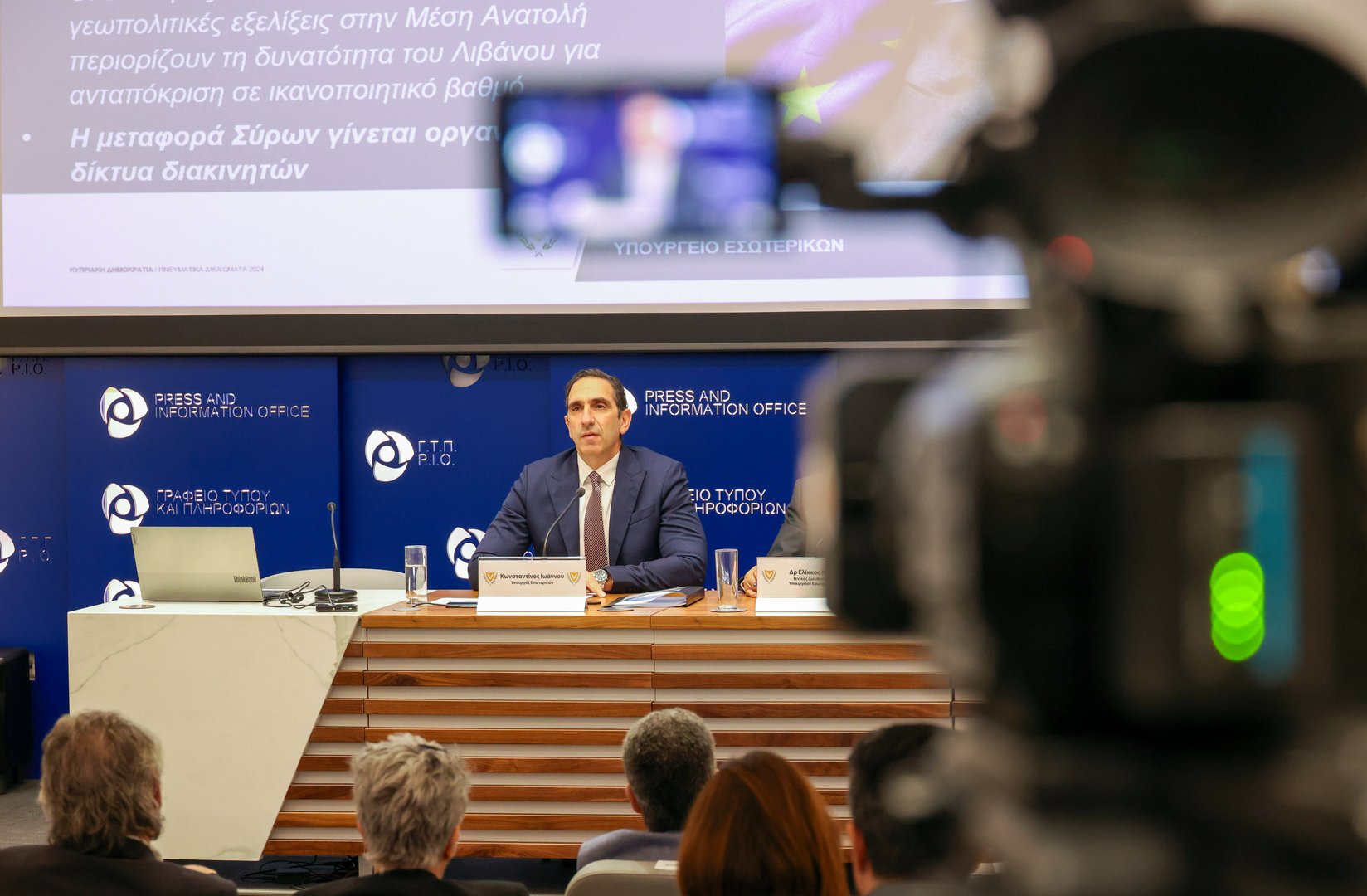Whereas the government is doing all it can to contain and manage the influx of migrants, the situation could still spiral out of control especially if neighbouring Lebanon collapses as a state, Interior Minister Constantinos Ioannou said on Tuesday.
At a press conference assessing his ministry’s work over the past year, Ioannou spent most of the time speaking on the issue of migration. A major vulnerability are Syrian nationals coming to the island from Lebanon, he said, while the outbreak of conflict in Gaza “has confirmed our worst fears”.
According to official data, in 2022 total asylum applications came to 21,565 – dropping to 11,617 in 2023. In addition, last year the number of asylum applicants from African countries declined to 2,607 from 9,384 in 2022.
But at the same time there was a steep rise in asylum applicants hailing from Syria. In 2022 they numbered 4,088, shooting up to 6,148 in 2023.
During the first quarter of this year Cyprus has achieved 1,000 more returns than in the corresponding period of 2023.
“Migration is not something that depends exclusively on our own actions or decisions, it’s impacted by many unknowns such as climate change but mainly political developments, as is happening with the war in our region,” said the minister.
In recent years Cyprus has been under “tremendous pressure” from migrant flows.
“As a result, today our country has the highest asylum applications per capita across the EU.”
Constantinou said that during the year the government will review its Nafkratis plan – the national emergency plan dealing with irregular migrants. In addition, authorities will roll out public awareness campaigns on voluntary returns, while intensifying checks on illegal hiring of migrants.
“At the same time, construction works continue for the creation of a pre-departure centre at Limnes, and for the upgrade of infrastructures at Kofinou and Pournara.”
The minister said the government has taken a multi-pronged approach to the migration issue – reducing arrivals, speeding up asylum applications, increasing the number of returns, and improving accommodation facilities for asylum seekers.
These actions have yielded results, particularly when it comes to returns.
“But the single biggest problem remains, that of the large number of Syrian nationals arriving on our shores by sea from Syria and mostly from Lebanon.
“As is well known, since the start of hostilities in Syria in 2011, that country is considered unsafe by various international organisations, which means that all Syrian nationals enjoy subsidiary protection status.”
This policy, the minister stressed, serves to “disarm” Cypriot authorities. It ties their hands, as authorities cannot assess these asylum applications on a case-by-case basis – they are all automatically granted subsidiary protection status. And in many cases, this is subject to abuse.
“Consequently,” he went on, “the pressure on the reception and hosting system is rising. Meanwhile, our proximity to Lebanon, where more than 1.5 million Syrians live, makes Cyprus the most attractive destination.”
Meanwhile Nicosia has for months warned that Lebanese authorities – due to political, economic and societal issues there – are unable to adequately monitor their country’s shoreline.
“So in our interventions to the European Commission, we sound the alarm, underlining that a potential collapse in Lebanon would lead to massive outflows of Syrian migrants headed to the EU.”
Lebanon’s shortcomings allow organised trafficking rings to have a field day, the minister asserted.
In this respect, Cyprus is working in two directions simultaneously.
“On the one hand, via the diplomatic route, we’re exerting pressure on the European Commission to reassess certain areas in Syria, to reclassify them from warzones to safe zones, so that temporary protected status is not granted automatically to people of Syrian extraction, but rather allow asylum applications to be examined on merit.”
To this end, Cyprus plans to host a ministerial conference looking at the external dimension of migration with an emphasis on Syria.
“We aim to unite with a coalition of countries with similar concerns, and to coordinate our actions. Also, we’ll be taking part in joint missions to Syria with other member states, gathering data about what areas may be designated as safe, so as to be able to ensure that everyone is protected.”
The other direction, said Ioannou, consists of boosting EU aid to Lebanon so that the country can better monitor its coastline. In this context, he and President Nikos Christodoulides will be travelling to Beirut again on May 2 together with the president of the European Commission.
The government recently put a freeze on accepting Syrian asylum applications, and will instead be keeping them in migrant camps here. Meantime Cypriot authorities have reportedly begun implementing the controversial policy of migrant pushbacks.







Click here to change your cookie preferences